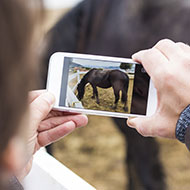
Videos designed to assist owners in telephone consults
A series of horse healthcare videos to help owners during the COVID-19 pandemic have been produced by the British Equine Veterinary Association (BEVA).
From taking a horse's pulse to treating wounds and lameness, the videos are designed to help owners convey information to a vet during a telephone consultation.
It is hoped the videos will help reduce the number of face-to-face interactions equine vets have with their clients, and ultimately prevent further spread of the virus.
They provide information on what details owners should provide, how to check for vital signs, and how to spot the early warning signs of disease.
BEVA chief executive David Mountford explains: “We need to do our utmost for equine health and welfare while protecting veterinary practitioners, horse owners and handlers”
“Lockdown restrictions mean that horse owners will have telephone-based consultations with their vet to help minimise face to face contact. These short, informative videos, made by equine vets, should help owners be able to answer some of the questions their vet may ask over the phone and enable the horse to be triaged promptly and efficiently during this challenging time.”
The videos can be found on the BEVA website.



 The RCVS has announced a new version of its 1CPD mobile app, with enhanced features for veterinary surgeons and veterinary nurses to record their continuing professional development.
The RCVS has announced a new version of its 1CPD mobile app, with enhanced features for veterinary surgeons and veterinary nurses to record their continuing professional development.